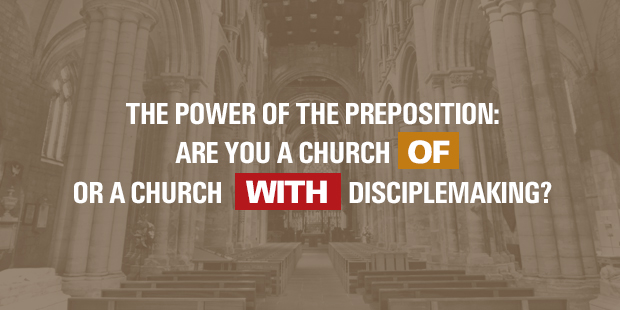
The Power of the Preposition: Are You a Church OF or a Church WITH Disciplemaking?
Is your church a church OF disciple-making or a church WITH disciple-making?
The question is not meant to offend or criticize, but rather to clarify. The question has been generated from numerous conversations with pastors and discipleship leaders on a daily and weekly basis. From experience, I know that these conversations are generated from “pain points” of these leaders. This blog post and the next several to follow will be centered on this subject or question.
I’ve borrowed a quote from a good friend of mine that begs consideration. “When the pain of staying the same is the greater than the pain of change, we will consider change!” One of the issues I hear from pastors on a consistent basis is dealing with spiritual immaturity in the church. This begs the question, is the church today doing a better job of teaching people how to be good members or disciples?
The term “disciple” simply means, “learner.” A disciple is some one who learns principles from someone else, sees those principles lived out by the discipler’s practices. Those principles and practices are then passed on to others. If a church is to be a disciple-making church, making disciples that make disciples, she must first embrace the following ideas.
1. Disciple-making is relational – “As the Father has loved me, so have I loved you. Now remain in my love. If you obey my commands, you will remain in my love, just as I have obeyed my Father’s commands and remain in his love. I have told you this so that my joy may be in you and that your joy may be complete. My command is this: Love each other as I have loved you. Greater love has no one than this, that he lay down his life for his friends. You are my friends if you do what I command. I no longer call you servants, because a servant does not know his master’s business. Instead, I have called you friends, for everything that I learned from my Father I have made known to you. You did not choose me, but I chose you and appointed you to go and bear fruit—fruit that will last. Then the Father will give you whatever you ask in my name. This is my command: Love each other. (John 15:9-16)
Disciples are made as a disciple-maker befriends and mentors a disciple.
2. Disciple-making is a stage-by-stage process – “We have much to say about this, but it is hard to explain because you are slow to learn. In fact, though by this time you ought to be teachers, you need someone to teach you the elementary truths of God’s word all over again. You need milk, not solid food! Anyone who lives on milk, being still an infant, is not acquainted with the teaching about righteousness. But solid food is for the mature, who by constant use have trained themselves to distinguish good from evil. (Hebrews 5:11-14)
Notice I said stage-by-stage, not stage-to-stage. The process is cyclical not linear. Disciples experience the following stages of spiritual growth; spiritually dead, spiritual infant, spiritual child, spiritual young adult, and spiritual parent. (Note: these stages of spiritual maturation are outlined in Real Life Discipleship)
3. Disciple-making is generational – “And the things you have heard me say in the presence of many witnesses entrust to reliable men who will also be qualified to teach others.” (2 Timothy 2:2)
Disciples are made, as one person who has been or is being discipled is discipling others.

Tags: Barry Sneed, Disciplemaking, Multiplication











